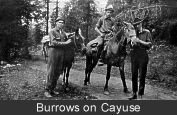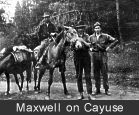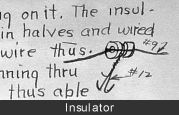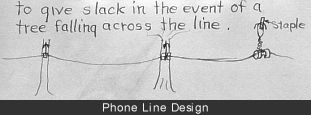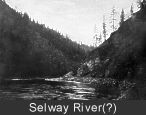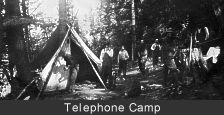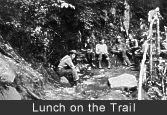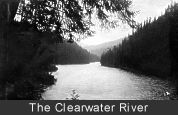| Chapter 2: Arrival in
Idaho
We reached Kooskia, Idaho June 30th, and I was met by a student named Wells and another named Grupe and some of the forestry officials (Howell and Maxwell). The trunk was stored at the hotel, and the next day we started walking from Kooskia toward Lowell, where the Selway and the Locksaw [Lochsa] rivers merge. Adolph Weholt was the assistant ranger, in charge of building telephone line from camp #1 to the fork. Camp #1 was 13 miles from Kooskia. In traveling this first stage I attempted to ride Maxwell's cayuse. A cayuse is a devil that looks like a spiritless old plug horse. He is as stubborn as a donkey, and believes in using his head to save his heels. This specimen felt me on his back, and immediately ambled over to a low-hanging limb and scraped me off without even looking around to see my fate. We put a 350-pound pack saddle on him, and I guess he wished he had stuck to my 120 lbs. These cayuses are native horses that can live on anything that grows there, and will dig for grass in the winter; hence their popularity. Maxwell owned the horses, as he was a patrolman covering many miles. The little mule got homesick and went to Kooskia three times that summer and Maxwell had to ride 150 miles extra on that account. I decided that a horse was too much trouble, and so walked. After leaving camp #1 we walked a few miles and pitched camp in a drizzling rain. We cut down balsam trees which were about 14" in diameter and made an open work crib to wall the cook tent. We lopped off the wet branches for our beds, and slept on them very comfortably. With this camp as a base we swamped a trail between the trees to string our telephone wire. This we pulled in as straight a course as possible, later raising it up the tree and fastening it with a slip insulator held by a large staple. We used linemen's climbers, knocking off the branches as we climbed. The wire was #3, which is heavy enough to withstand small limbs falling on it. The insulators were made in halves and wired together over the wire thus [sketch]. The line wire, running thru the insulator, was thus able to give slack in the event of a tree falling across the line. The photo below [second row, left] shows the camp above described. My tent is on the right. |

